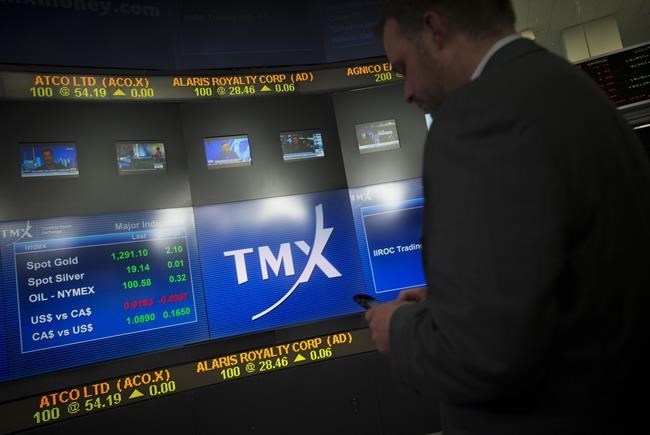TORONTO — Canada's main stock index edged higher midweek as a big gain by the country's most valuable company offset weakness in the energy sector.
Shares of Shopify Inc. surged 8.3 per cent after a U.S. analyst upgraded the tech darling.
"When you see the No. 1 stock in Canada taking a huge move like that, it's certainly very positive news for the sector," said Michael Currie, vice-president and investment adviser at TD Wealth.
As a result, the technology sector was the best performer on the TSX, climbing 1.8 per cent.
The S&P/TSX composite index closed up 60.94 points to 17,567.42.
In New York, the Dow Jones industrial average was down 44.77 points at 30,154.54. The S&P 500 index was up 6.55 points at 3,701.17, while the Nasdaq composite was up 63.13 points at 12,658.19, after setting another record high of 12,687.32 in earlier trading.
Materials rose 1.4 per cent on higher gold prices with First Majestic Silver Corp. increasing 7.1 per cent.
The February gold contract was up US$3.80 at US$1,859.10 an ounce and the March copper contract was up 1.45 cents at nearly US$3.56 a pound.
Energy was the weakest of any sector, dropping 2.5 per cent despite higher crude oil prices.
The January crude oil contract was up 20 cents at US$47.82 per barrel and the January natural gas contract was down half a cent at almost US$2.68 per mmBTU.
Several Canadian oil producers saw their stocks fall. Husky Energy Inc. was down 3.9 per cent, Canadian Natural Resources Ltd. off 3.3 per cent and Cenovus Energy Inc. 3.1 per cent lower.
U.S. crude stockpiles fell last week by 3.1 million barrels while efforts to approve a U.S. stimulus package would be positive for oil demand.
Oil demand in the U.S. is down 13 per cent year-to-date due to the pandemic.
Also negative for oil was a 1.1 per cent decrease in U.S. retail sales in November on growing COVID-19 infections and lower household income.
Industrials moved lower on a 10.1 per cent decrease in Air Canada shares after the airline priced its previously announced public offering of 35.4 million shares at $24, for gross proceeds of $850 million.
Meanwhile, U.S. markets reacted marginally to the U.S. Federal Reserve, which once again vowed on Wednesday to keep buying bonds each month until they reach their goals of maximum employment and price stability.
The central bank also upgraded its 2020 GDP productions projections to a decline of 2.4 per cent from the 3.7 per cent drop it outlined in September.
It also raised its forecasts for 2021 to 4.2 per cent from four per cent and said the unemployment rate should drop to five per cent from a revised forecast of 6.7 per cent in 2020.
"On the positive side, you've got a lot of optimism on the stimulus package coming. On the other hand, you've got the Fed saying there's still a lot of work to be done," Currie said.
The Canadian dollar traded for 78.41 cents US compared with 78.60 cents US on Tuesday.
In Canada, the annual inflation rate in November rose to its fastest pace since the start of the pandemic, driven by a rise in prices for homes, rent and goods around the house.
Statistics Canada said Wednesday the one per cent increase in the consumer price index compared with November 2019 was up from a year-over-year increase of 0.7 per cent in October and 0.5 per cent in September.
This report by The Canadian Press was first published Dec. 16, 2020.
Companies in this story: (TSX:AC, TSX:FR, TSX:HSE, TSX:CNQ, TSX:CVE, TSX:GSPTSE, TSX:CADUSD=X)
Ross Marowits, The Canadian Press



